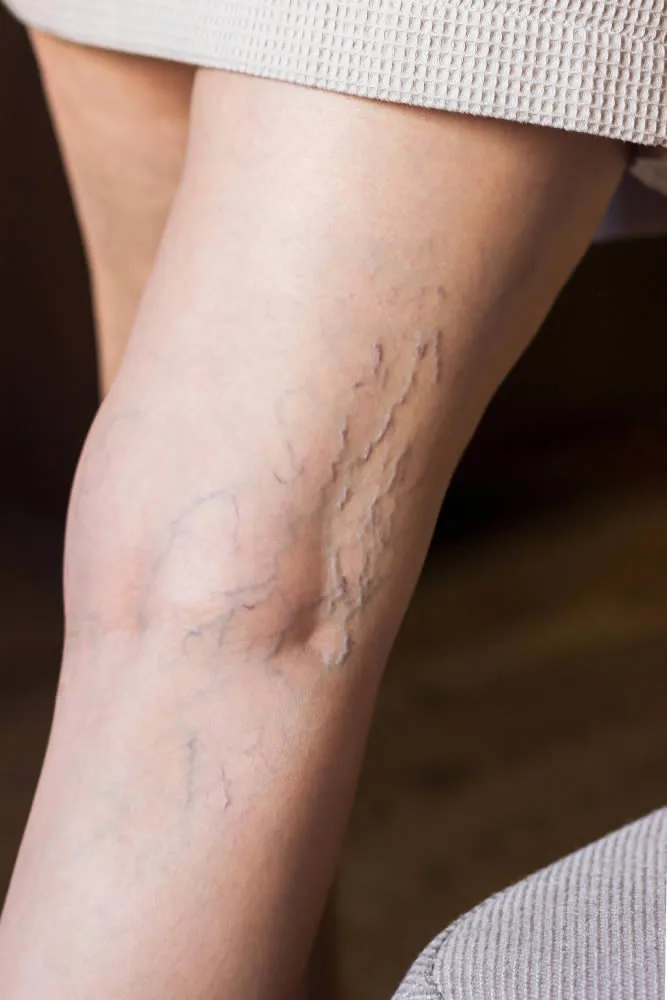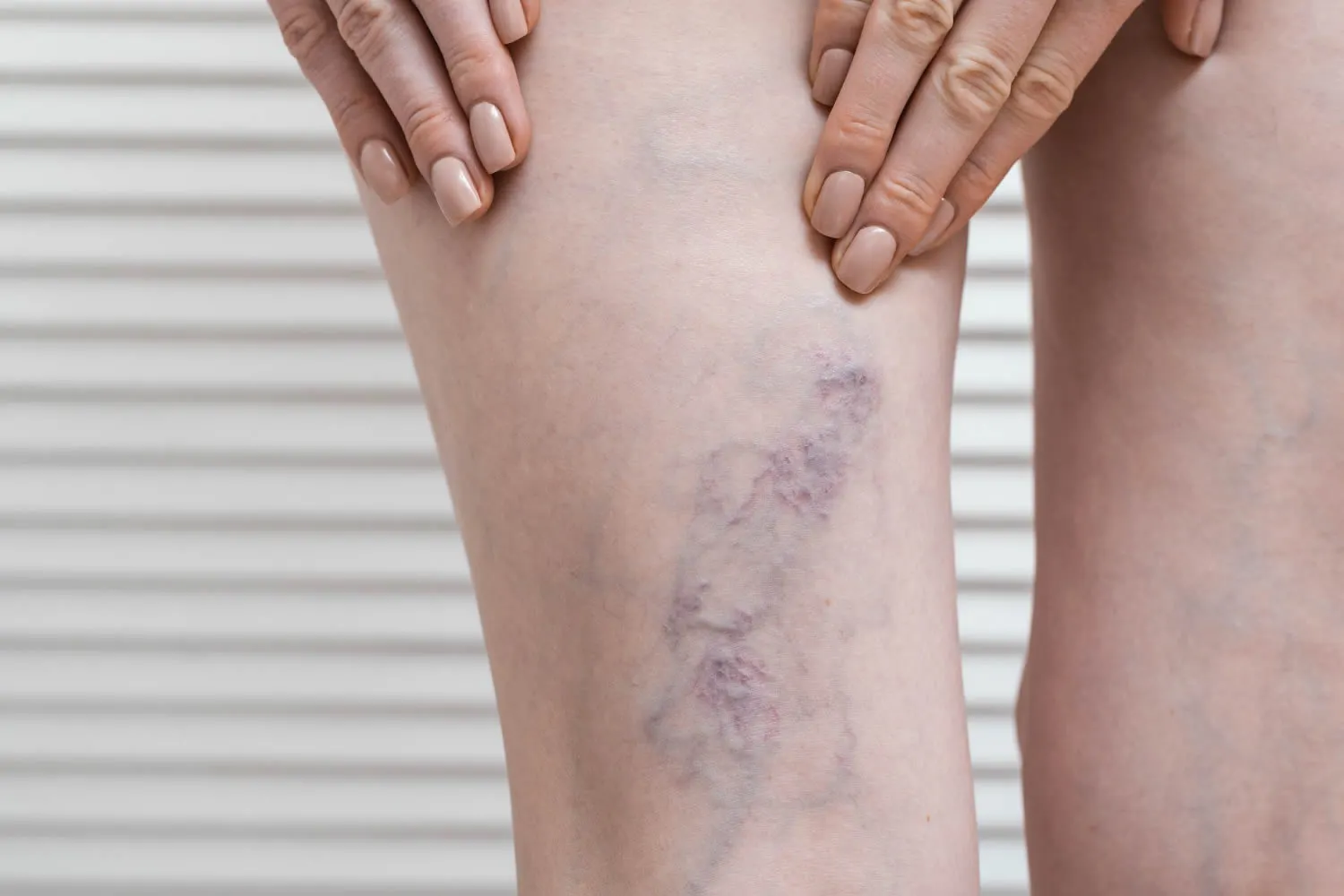What is Endovenous Laser Treatment?
Endovenous Laser Treatment (EVLT) is a minimally invasive procedure used to treat varicose veins. The procedure involves the use of laser energy to seal off the affected vein and redirect blood flow to healthier veins.
During the procedure, a small laser fiber is inserted into the vein through a tiny incision in the skin. The laser energy is then delivered to the inside of the vein, causing it to heat up and eventually collapse. Over time, the treated vein is absorbed by the body and blood is redirected to healthier veins.
EVLT is typically performed on an outpatient basis and patients can return to normal activities soon after the procedure. The procedure is less invasive than traditional surgical treatments for varicose veins and has a lower risk of complications and a quicker recovery time.
However, like any medical procedure, EVLT is not without risks. Possible risks include skin discoloration, pain or swelling at the site of the incision, and the development of blood clots in the treated veins. It is important to discuss these risks and the potential benefits of EVLT with your doctor before undergoing the procedure.

How EVLT Works
- Consultation and Assessment:
Before undergoing EVLT, a thorough consultation with Dr. DrName at PracticeName in CityName is essential. During this consultation, your medical history, symptoms, and venous condition will be evaluated to determine whether EVLT is the appropriate treatment for you. - Local Anesthesia:
On the day of the procedure, you’ll be positioned comfortably in a treatment room. Local anesthesia will be administered to the area where the targeted vein is located. This ensures your comfort throughout the procedure. - Guided Laser Insertion:
A thin laser fiber is inserted into the affected vein through a tiny incision, typically using ultrasound guidance. The laser fiber emits a controlled amount of laser energy that generates heat. This heat seals the damaged vein, causing it to collapse and close off. Blood flow is naturally redirected to healthier veins, improving overall circulation. - Precise Laser Energy Application:
As the laser fiber is carefully withdrawn, the laser energy is applied in segments along the length of the vein. This controlled approach maximizes the effectiveness of the treatment while minimizing discomfort. - Monitoring and Real-time Imaging:
Throughout the procedure, advanced imaging techniques such as ultrasound are used to monitor the progress of the laser fiber and ensure accurate and targeted energy application. - Immediate Effects and Gradual Improvement:
Patients often notice an immediate reduction in the appearance of the treated vein as it begins to collapse. Over the following weeks and months, the body naturally absorbs the closed vein, resulting in smoother and healthier-looking skin. - Compression and Recovery:
Following the procedure, a compression stocking may be recommended to promote healing and minimize swelling. You’ll be able to resume most of your normal activities shortly after the procedure, though strenuous exercise and prolonged standing may be advised against for a short period. - Follow-up and Monitoring:
Regular follow-up appointments with Dr. DrName are crucial to monitor your progress and ensure that the treatment goals are being achieved. Dr. DrName will assess your response to the treatment and make any necessary recommendations for further care.
Understanding Venous Insufficiency
Venous insufficiency is a common medical condition that occurs when the veins in your legs have difficulty returning blood to your heart efficiently. This condition can lead to various symptoms and complications, including the development of varicose veins, discomfort, and swelling.
Causes of Venous Insufficiency:
Venous insufficiency often results from weakened or damaged valves within the veins. These valves play a crucial role in preventing blood from flowing backward. When they malfunction, blood can pool in the veins, leading to increased pressure and potential vein dilation.
Common Symptoms:
- Varicose Veins: Bulging, twisted veins that are visible on the skin’s surface.
- Leg Discomfort: Aching, heaviness, or cramping, especially after prolonged standing or sitting.
- Swelling: Swollen ankles and lower legs due to fluid accumulation.
- Skin Changes: Skin may become discolored, dry, or irritated near affected veins.
Diagnosis:
Diagnosing venous insufficiency involves a thorough physical examination and may include imaging tests such as ultrasound. DrName at PracticeName will assess your symptoms, medical history, and perform necessary tests to determine the extent of the condition.
Endovenous Laser for Varicose Veins
Varicose veins are caused by a malfunction in the valve system that controls blood flow in the veins. When the valves are not functioning properly, blood can pool in the veins, leading to the characteristic swelling and twisting of varicose veins. The underlying cause of this valve malfunction can be due to a variety of factors, including:
- Age: The risk of developing varicose veins increases with age.
- Genetics: There is a hereditary component to the development of varicose veins, so if you have a family history of the condition, you may be at a higher risk.
- Gender: Women are more likely to develop varicose veins than men.
- Pregnancy: Pregnancy can increase the risk of developing varicose veins due to increased blood volume and pressure on the veins.
- Weight: Obesity or being overweight can put additional pressure on the veins, increasing the risk of varicose veins.
- Prolonged standing or sitting: Prolonged periods of standing or sitting can increase the risk of developing varicose veins.
Benefits of Endovenous Laser Treatment
With EVLT, you can experience a range of benefits that contribute to a quicker recovery, minimal discomfort, and improved quality of life.
- Minimally Invasive Approach:
EVLT is a minimally invasive procedure that involves a small incision and the use of a thin laser fiber to treat damaged veins. Unlike traditional surgery, there is no need for extensive incisions or general anesthesia. This results in less trauma to surrounding tissues, reduced scarring, and a shorter recovery period. - Faster Recovery Time:
One of the remarkable benefits of EVLT is its shorter recovery time compared to traditional vein surgeries. Most patients can return to their normal activities within a day or two after the procedure. This allows you to get back to your daily routine sooner, without the extended downtime associated with surgery. - Less Discomfort and Pain:
EVLT causes minimal discomfort during and after the procedure. The local anesthesia used for the treatment ensures that you experience only minor discomfort, and any discomfort that arises post-procedure is typically manageable with over-the-counter pain relievers. This is in contrast to the more significant pain often associated with traditional vein stripping surgery. - Effective and Precise Treatment:
The laser energy used in EVLT is precisely targeted to the damaged veins, sealing them off and redirecting blood flow to healthier veins. This precision reduces the likelihood of recurrence and offers effective, long-lasting results. - Improved Aesthetic Appearance:
Varicose veins can be unsightly and may lead to self-consciousness. EVLT not only improves the functionality of the veins but also contributes to a more aesthetically pleasing appearance. Over time, treated veins fade, allowing you to enjoy smoother, clearer skin. - Reduced Risk of Complications:
Because EVLT is minimally invasive and doesn’t require general anesthesia, the risk of complications is significantly lower than with traditional surgical methods. This makes EVLT a safer option for individuals who may have underlying health concerns. - Outpatient Procedure:
EVLT is typically performed on an outpatient basis, meaning you can return home on the same day as the procedure. This eliminates the need for a hospital stay and ensures a more comfortable and convenient experience for our patients.

What Are Some of the Side Effects of Endovenous Laser Treatment?
Some common symptoms of varicose veins include:
- Pain or aching in the legs
- Swelling of the ankles or feet
- Itching or burning in the affected area
- Cramping or fatigue in the legs
- Visible blue or purple veins on the surface of the skin
- Skin discoloration or thickening around the affected veins
It is important to note that not everyone with varicose veins will experience symptoms, and the severity of symptoms can vary greatly between individuals. If you are experiencing any symptoms related to varicose veins, it is important to discuss them with your doctor so that they can determine the best course of treatment for your individual needs.
FAQ About Endovenous Laser Treatment
Is EVLT painful?
How long does the EVLT procedure take?
How soon can I return to normal activities after EVLT?
How long does the results of EVLT last?
What are the alternatives to EVLT?
Other treatment options for varicose veins include sclerotherapy, microphlebectomy, and compression stockings.
Is there a dermatologist near me in Newark that offers Endovenous Laser Treatment?
Yes. At our Newark dermatology office we offer Endovenous Laser Treatment to patients from Newark and the surrounding area. Contact our office today to schedule an appointment.

